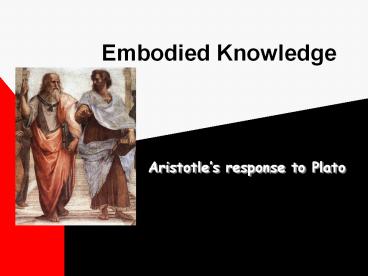Embodied Knowledge - PowerPoint PPT Presentation
Title:
Embodied Knowledge
Description:
Plato: man of wisdom not only does the right thing, but can give grounds for his ... Contra Plato, Aristotle argues that we can have demonstrative knowledge (science) ... – PowerPoint PPT presentation
Number of Views:102
Avg rating:3.0/5.0
Title: Embodied Knowledge
1
Embodied Knowledge
- Aristotles response to Plato
2
(No Transcript)
3
(No Transcript)
4
The Questions of Philosophy
- Philosophysearch for wisdom
- Philosophy as direct access to ultimate reality
the world of eternal unchanging things
philosopher seeks wisdom about true nature of
reality. - For Aristotle, what is called wisdom is supposed
to deal with the first causes and principles of
things. - Plato man of wisdom not only does the right
thing, but can give grounds for his action that
standup to examination.
5
Comparison with Platos Views on Knowledge
- Platos theory of ideas
- ideas external to the mind
- The Good is transcendent and the ordering
principle of the ideas and the soul - There is one best stateie., that ruled by a
philosopher-king
6
Comparison with Aristotles Views on Form
- For Aristotle there is no transcendent realm of
ideas - The only things that exist are individual
substances - Substance matter form
- The forms, or principles of knowledge for Plato,
are the constituent organizing principles of
individual things and - They inhere in matter
7
Comparison with Aristotles Views on Knowledge
Knowledge derived from sensation and demonstration
8
Comparison with Aristotles Views on Knowledge
from sensation there arises a memory, and from
many memories of the same thing there arises an
experience. Principles of art and science arise
from sensation, like a rout in battle brought
about when one man makes a stand, then another,
then a third until a principle is
attained. (Posterior Analytics, Bk II, Ch. 19,
3-15)
Knowledge derived from sensation and demonstration
9
Aristotles Analysis of Causality
Nature a master craftsman
- Four Causes
- material cause
- agent cause
- formal cause
- final cause
Contra Plato, Aristotle argues that we can have
demonstrative knowledge (science) about the
material world
Why? Forms are principles of organization and
change
10
Formal, Agent, and Final Cause
11
Matter and Substance Elements, Qualities
Natural Place
Fire
Air
Earth
Water
12
Cosmos an orderly self-replicating whole
Systematic hierarchies of orderly patterns
inhering in things
13
Polis
- Material Cause
- Formal Cause
- Efficient Cause
- Final Cause
- Individual citizens/ resources
- Constitution/ way of life
- Statesmen-lawgiver
- City-State good life
14
Aristotles Politics
- Every state is a community of some kind, and
every community is established with a view to
some good for mankind always act in order to
obtain that which they think good. But, if all
communities aim at some good, the state or
political community, which is the highest of all,
and which embraces all the rest, aims at good in
a greater degree than any other, and at the
highest good.
15
purpose of the state is the Good Life
- When several villages are united in a single
complete community, large enough to be nearly or
quite self-sufficing, the state comes into
existence, originating in the bare needs of life,
and continuing in existence for the sake of a
good life. And therefore, if the earlier forms of
society are natural, so is the state, for it is
the end of them, and the nature of a thing is its
end. For what each thing is when fully developed,
we call its nature, whether we are speaking of a
man, a horse, or a family. Besides, the final
cause and end of a thing is the best, and to be
self-sufficing is the end and the best.
16
Comparison of Aristotle and Platos Politics
- Plato defined the Good as absolute and
transcendent - There is one best state (absolute monarchy ruled
by a philosopher-king) - All other states are degenerate and imperfect
forms of this best state
- For Aristotle the good is relative to the nature
of the organism in question - The state can be realized in many different
forms, depending on the individuals who make it
up
17
Aristotles Types of Constitution
Correct Deviant
One Ruler Kingship Tyranny
Few Rulers Aristocracy Oligarchy
Many Rulers Polity Democracy
18
(No Transcript)































